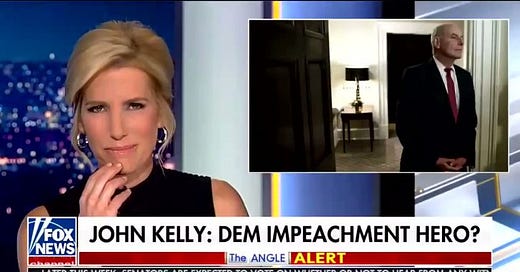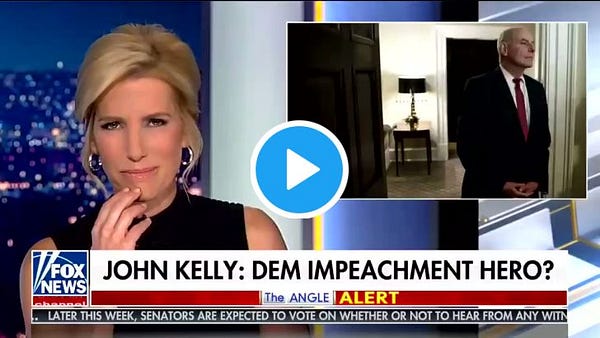January 28, 2020
Today felt very unsettled. There were a lot of stories, but two of the key ones seemed to have a subtext that we don’t know, so the meaning of the stories is not clear.
Before that, though, the Pentagon now says at least 50 U.S. troops suffered traumatic brain injuries in the Iranian strike on the Iraqi bases.
Today the lawyers defending Trump against the House’s charges in the articles of impeachment ended their case. Their defense echoed the past several days: they largely ignored the charges against Trump and instead attacked the Bidens and Trump’s other political enemies, including former President Barack Obama, former FBI Director James Comey, former Special Counsel Robert Mueller, former FBI agents Lisa Page and Peter Strzok, none of whom have anything to do with this impeachment process, but all of whom are people Trump blames for his troubles. In Politico, Andrew Desiderio and Kyle Cheney called Trump lawyer Jay Sekulow’s final speech “a sort of grand finale of Trump’s grievances, a speech that appeared geared toward his client as opposed to the audience of Senate Republicans looking for reasons to vote to acquit. Some senators left the chamber seemingly bewildered by the performance and tone.”
Overshadowing the trial, though, was the lingering question of what to do about the bombshell dropped Sunday night by Trump’s former National Security Advisor John Bolton. Bolton has offered to testify, under oath, to the Senate, and leaks about his forthcoming book say that in it he has recounted a direct conversation in which Trump links military aid to Ukraine to a smear campaign against Trump’s Democratic rival Joe Biden. If true, this provides the piece of impeachment evidence Republicans have insisted did not exist (although Ambassador to the European Union Gordon Sondland also testified to it, and the July 25 call between Trump and Ukraine President Volodymyr Zelensky mentions it as well). They said there was no direct evidence that Trump was involved in the scheme. Bolton seems to be able and willing to provide that evidence.
This puts Republican senators in a bad position. They do not want to upset Trump’s base—their firm voters—by voting to convict the president. But they also don’t want to rubber stamp illegal activity. Not only will that infuriate the now 75% of Americans who want to hear witnesses, it will also implicate them in a coverup, opening the door to investigations of their own behavior. The pressure was great for witnesses even before Bolton’s bombshell, but since Sunday the pressure to hear from at least Bolton has ratcheted up. Today, the right-slanting National Review magazine ran the news that Trump’s former chief of staff, retired General John Kelly told a crowd that “If John Bolton says that in the book I believe John Bolton.” On the Fox News Channel, Laura Ingraham tried to make fun of Kelly’s stand, but it rang hollow. Trump supporters are worried.
Oklahoma Senator James Lankford and South Carolina Senator Lindsey Graham have floated the idea of being able to read Bolton’s manuscript in a secure location; other Republicans have backed into the idea that perhaps they will have to let Bolton testify, but if so, they will insist on hearing from Hunter Biden. This will be problematic to defend, though, since there has been no testimony about what Trump knew or believed about Hunter Biden, so there is no way to tie Trump’s alleged concerns about Biden to the case at hand. At this point, Republicans seem largely to be testing options to figure out how to get out from under the Bolton bombshell.
After Trump’s lawyers finished, Republican senators conferenced about what to do about Bolton and other witnesses, and tonight the Wall Street Journal and the Washington Post reported that Senate Majority Leader Mitch McConnell told the senators that he did not have the votes to prevent testimony. (Remember that while the Senate needs two-thirds of all the senators present to convict Trump, it only needs a simple majority—51 votes—to change the rules. That means four Republicans need to join the Democrats to demand witnesses. McConnell seems to be saying that those four votes have switched.)
That does not mean there will actually be witnesses. It only means that the Senate might vote to allow them, but then might vote against hearing any of the witnesses proposed. Even if it does allow witnesses, the rules require that they be deposed in a secure setting first, to determine that nothing they say will compromise national security. We know that this administration’s definition of national security is exceedingly expansive (and we suspected this rule was designed with Bolton’s testimony in mind—now that we know the White House had his manuscript, that only seems more likely).
But I am suspicious even with all those caveats. I am very skeptical of anything McConnell says or does; he is one of the slyest politicians in our history. I am sitting here wondering what or who he is trying to signal by letting this information leak. If McConnell really were on the losing end of a vote, he would never let that information be public. So what’s he up to?
That subtext has bothered me this evening, and so has Trump’s announcement tonight of his new Middle East peace plan. I know no more about the Middle East than any reasonably informed American, but this plan jumps out in me in two ways that reflect my own training as an American political historian. First of all, the terms of the plan are eerily reminiscent of the “peace plans” nineteenth-century American politicians promised voters who wanted lands belonging to America's native peoples. The settlers would get the land and sovereignty, with strong defense of their own safety, and in exchange the lucky natives—who were not invited to participate in the writing of the deal-- would get a reservation, an injection of cash, and then capital investment from settlers on their newly opened lands. We all know how that worked out. I have no idea if this is an apt comparison here, but boy, howdy, is the language virtually identical.
In 1889, President Benjamin Harrison made this very promise to his voters before a key midterm election… and that is the other thing that jumps out to me. The plan is essentially a checklist of everything Israeli leader Benjamin Netanyahu has wanted, and it is being widely interpreted as Trump’s attempt to help the indicted Israeli politician in his upcoming elections. But it is also designed to appeal to American evangelical voters, whom Trump has been courting desperately since the Christianity Today article urged evangelicals to abandon him.
As I say, I cannot speak to the Middle East side of this deal (although I did see that Jordan, next to Israel, rejected it out of hand tonight because the Palestinians were not consulted), but the American side looks to me as if we are, once again, arranging our foreign policy to reelect Donald Trump. So, like the story that McConnell doesn’t have the votes he needs to prevent testimony, the Middle East peace plan story, too, seems to me to have a subtext very different than what shows on the surface.
I guess it feels a bit as if the script that we all knew had been written—that McConnell would run the Senate trial however he wished to exonerate Trump and the Democrats would make the best of a bad hand—has suddenly been challenged by regular Americans demanding testimony, but it is not yet clear who will be doing the rewrite.
——
Notes:
Kelly:
75% https://poll.qu.edu/national/release-detail?ReleaseID=3654
Middle East peace plan: https://www.theguardian.com/world/2020/jan/28/trumps-middle-east-peace-plan-key-points-at-a-glance
Jordan:

Politico: https://www.politico.com/news/2020/01/28/trump-gets-impeachment-payback-wanted-108024



